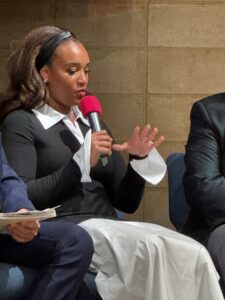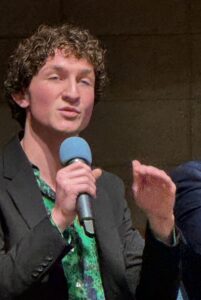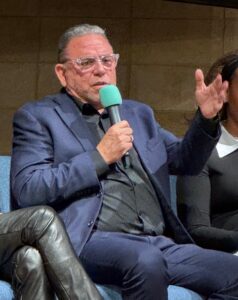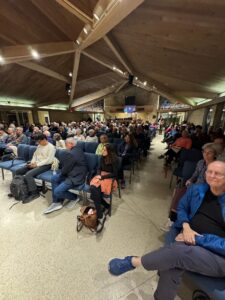At Sarasota event, Disabled South, SEE Alliance, UnidosNow leaders talk about breaking out of silos.
Johannes Werner
Original Air Date: Jan. 24, 2025
Host: The three grassroots leaders and the topic packed the house. On Thursday night, the Sarasota Unitarian Universalists’ sanctuary was home to a discussion about coalition building. Sponsored by the Boxser Diversity Initiative, the organizers’ aim was to find ways of moving beyond our comfort zones, commonly known as silos. The WSLR News team was there to train the microphone on Kehsi Iman Wilson, executive director of Atlanta-based Disabled South; UnidosNow founder C.J. Czaia; and SEE Alliance founder Zander Moricz.

Kehsi Iman Wilson. Photo by Johannes Werner.
Kehsi Iman Wilson: One thing that people forget: It’s human nature—we have a tendency to self-organize into silos. We like to put ourselves and put other people in boxes. It’s just how our brains are wired. My call to action is always to resist that tendency and to remember also that we’re not a monolith. No matter what identity we’re talking about, there are massive differences across every identity group. It’s like you mentioned: In those moments of struggle, we have to align around what are our shared values and what is our shared end goal? Because otherwise it’s easy for things to devolve back into our subgroups and get to that place.
Johannes Werner: This is how Kehsi Iman Wilson framed the problem.
Zander Moricz: We kept building. We used the big wins in 2022 and 2023. I should know. In 2022, SEE Alliance successfully organized with 40,000 high schoolers. 40,000 high schoolers walked out, wore a “Say Gay” sticker, protested, registered to vote—40,000 Floridian high schoolers took action. We moved that into 2023, and 300 colleges and high schools walked out. We moved that into 2024, and what I will say is that we were the most reported social justice movement in the southern eastern United States last year, we won every single campaign we worked on in the state of Florida, and, with the No on One campaign on Nov. 5, the SEE Alliance successfully led a coalition effort that reached 7 million Floridian voters in three weeks; onboarded, trained, and organized 380 canvassers to deliver that message; and we successfully secured a “No” vote on Amendment 1, which would have turned our school board elections partisan. And so, as things feel like they’re raining down upon us and we can’t win and we’re going horribly, from 2022 to 2023 to 2024, a youth-led movement has secured victories around the defense of education. If you’ve organized with SEE Alliance in the room, can you please put your hand up? Can we give them a shout-out?
[Applause]
JW: That’s the list of achievements Zander Moricz rattled down. Those achievements of his SEE Alliance would have been impossible without reaching out to people who may not agree on everything. The unifying factor, according to Moricz, is age. While half of the young people in Florida “think” they’re Republican, by far most young people share the same goals.

Zander Moricz. Photo by Johannes Werner.
ZM: Young people, when they communicate, when they organize, it resonates best with young people, and in the state of Florida, the reason we’re focused on young people is we are the best and biggest untapped voting population. Across demographics, across party lines, 78% of all young people in Florida hold the same value set. Half of them think they’re Republicans, and they still want to address the climate crisis, they still want reproductive access, they still want rights and justice for queer, trans, Black and brown people. What we know is if we can educate and activate the young people of Florida, not only will it obviously benefit the young people of Florida, it is enough to trigger every single electoral outcome and community benefit we need to secure the short-term protections we need to protect our communities and build the long-term power that will change the state of Florida. The youth voting population is everything. It can truly change this whole state. We’ve learned a lot in building a coalition to reach them.
JW: CJ Czaia’s UnidosNow has focused almost entirely on opening up educational opportunities for immigrants and their children. The organization has put close to 4,500 young Hispanics from Southwest Florida through college. That, in itself, seems to be a unifying approach—in a so-called community that actually isn’t one.
CJ Czaia:

CJ Czaia. Photo by Johannes Werner.
CJ Czaia: If you go to the DR and you say, “Who picks up the garbage here?” they say, “Not us. The Haitians.” You go to Puerto Rico and you say, “Who picks up the garbage?” “Not us. The Dominicans.” You go to New York, “Who picks up the garbage?” “The Puerto Ricans.” Everybody steps on everybody. For me, when you talk about coalition building, first, it’s your own group that has to work together and has to believe in themselves, and they’re so ripped up by the propaganda of being a leftist. If you want to defeat a Democrat, you’ll say he’s a leftist to a Hispanic because they’re tired of Chávez and Maduro and Castro.
JW: UnidosNow tries to build coalitions by focusing on the need for education those disparate groups of immigrants share, right here in the United States.
CC: For us—for me—in the Hispanic community, it’s wanting to get all Latinos together. I put a song together, believe it or not. It’s called “Pa’lante.” You should check it out. It’s under Abogado CJ on Spotify and Apple, and it’s about getting all the Latinos—I’m serious! Because the idea was to get all Latinos to understand we have one flag in this country. It’s the Stars and Stripes. We come from Guatemala, Honduras, Nicaragua—like my mother—or wherever; we all have to understand that we’re in this big boat together, and we need to work together as a coalition of us.
JW: Zander Moricz had some hands-on advice.

Crowd at the Sarasota Unitarian Universalists’ sanctuary for the “Power & the People” panel. Photo by Johannes Werner.
ZM: Your coalition must be 50% productive—you need to have a direction; you need to have a structure—and 50% responsive. Whenever I say that, people are like, “Really? 50% responsive?” 50% responsive. If we did not save organizing, strategic, and fundraising capacity to address things as they come, our coalition would be locked and have nothing to do about the fact that DeSantis is convening a special session next week. We need to be both proactive and responsive. In addition to this, we need to share not only values but data. What we find is that many coalitions will come together because they have a value that brings them to a goal in mind. “We all want justice in Sarasota. Let’s come together.” But if we have different understandings about what that justice means, the strategies to get there, the campaigns that matter, the places that matter, the community we actually live in in terms of data, then we’re never going to be able to actually achieve the things we need to be able to achieve, so it needs to be values and it needs to be data. The final thing is you can’t just be running away from something; you have to be running toward something. What we’ve found is that coalitions will dissolve and they will become less effective over an exponential curve if it is exigenced in fear or hate.
JW: Reporting for WSLR News, Johannes Werner.
WSLR News aims to keep the local community informed with our 1/2 hour local news show, quarterly newspaper and social media feeds. The local news broadcast airs on Wednesdays and Fridays at 6pm.